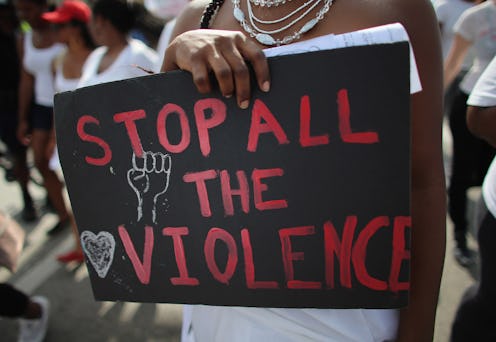News
This New York Bill Will Change Domestic Abuse Survivors' Lives If It's Signed Into Law

Survivors of domestic violence or sexual abuse in New York could become eligible for paid time off under a new bill unanimously approved by the New York City Council earlier this week. If signed into law, the legislation would amend New York's city code to require that employers provide any employee that has been a victim of a family offense matter such as stalking, domestic violence, or sexual abuse with paid time off to seek support services or legal aid. And according to advocates, this bill could be life-changing for domestic violence survivors who may have once felt trapped between choosing their paycheck over pursuing justice and ensuring their safety.
"This essential measure will empower survivors to confront their situations with the knowledge that their workplaces are on their side and acting in their best interest," New York City Council Speaker Melissa Mark-Viverito tells Bustle in an emailed statement. "For women and men facing vulnerable realities on a daily basis, the provision of paid leave is invaluable to building a better future."
The bill, which was introduced by New York City Councilwoman Julissa Ferreras-Copeland in October 2016, would establish paid "safe time" for survivors. Such "safe time" would allow survivors to take up to five paid days off a year in order to obtain support, protection, or relocation services, seek out legal aid, or meet with law enforcement or court officials.
Given the stress, emotional toll, and legal logistics victims of family offense matters often undergo, paid time off could serve as a crucial resource for anyone looking to leave an abusive or dangerous situation. "Any effort to give people the ability to take that needed time off to address these issues and to take care of their safety is a good thing," Michael Polenberg, vice president of government affairs at Safe Horizon, tells Bustle. Safe Horizon calls itself the nation's "leading victim assistance organization" and works with people who have been the victims of violence.
According to Councilwoman Ferreras-Copeland, survivors of domestic violence have reported missing, on average, 7.2 days of work as a result of dealing with their assault. "We found that oftentimes women would miss appointments with either a DA or miss appointments at the police precinct, or unfortunately in some cases have to go and serve orders of protection, and they had to go themselves and weren't able to do that because they couldn't take the time off work," Ferreras-Copeland said, according to the New York Daily News.
Moreover, young or low-income survivors can often be disproportionately impacted by financial or work-related concerns during the process of leaving an abusive situation behind or pursuing justice in a court of law.
"Poor and low-income survivors are often faced with the impossible choice of protecting themselves from violence or keeping a roof over their children's heads," Tobi Erner, a social worker in the Domestic Violence and Family Law Advocacy Project at Queens Legal Services, tells Bustle. "Employment protections to ensure economic security are paramount in enabling survivors to protect themselves from violence without compromising the financial stability of their families."
"Survivors shouldn’t be punished because the actions of their abuser has created a crisis in their lives," Erner explains to Bustle. "Escaping an abusive situation is a process, and this process takes time, energy, resources, and planning."
According to Erner, things like filing for an Order of Protection, which establishes court-ordered restrictions to an abusers' behavior, often mean the survivor has to attend multiple appointments and court dates, potentially requiring them to take time off work. In some instances, Erner says the stress of lost wages or needing time off work can often impact a survivor's ability to seek help.
Advocates for survivors agree it's important to ensure survivors of both domestic violence and sexual abuse are able to seek help and make choices without being weighed down by concerns about missed wages, lost jobs, or even employer retaliation.
"This is absolutely an economic justice or economic advocacy issue for survivors," Jessica Moreno, capacity building manager for Break the Cycle, a nonprofit aimed at supporting young people in ending and preventing abuse, tells Bustle. "A lot of times people don't consider that layer when they think about the experiences of survivors. [But] economic and financial situations are barriers to a survivor considering what their options are."
Since being approved by the New York City Council in a unanimous vote Tuesday, the legislation is currently on its way to New York Mayor Bill de Blasio's desk. And while the mayor hasn't explicitly said that he'll sign the bill into law since it was passed by City Council, he's both a supporter and a co-sponsor of the legislation. "As a co-sponsor, we strongly support this bill and are committed to supporting survivors," Olivia Lapeyrolerie, the deputy press secretary for Mayor de Blasio, confirms to Bustle.
Should the mayor sign the bill into law, New York will become the fourth U.S. city to require employers to provide survivors of domestic violence or sexual abuse with paid time off. Chicago, Los Angeles, and Pittsburgh already have similar laws.
Ultimately, advocates say this legislation could stand to have a huge impact on survivors of domestic violence and sexual abuse. "Paid 'Safe Time' is a lifeline that will enable survivors to focus on emergency planning and protection, without fearing that doing so will compromise their ability to pay their rent and feed their children," Erner says.